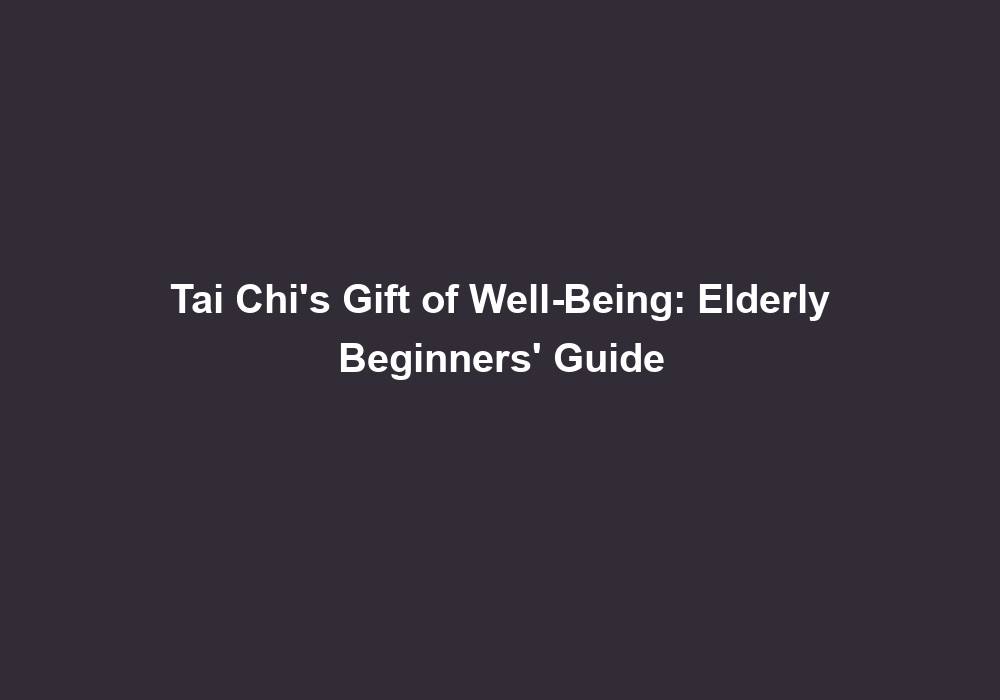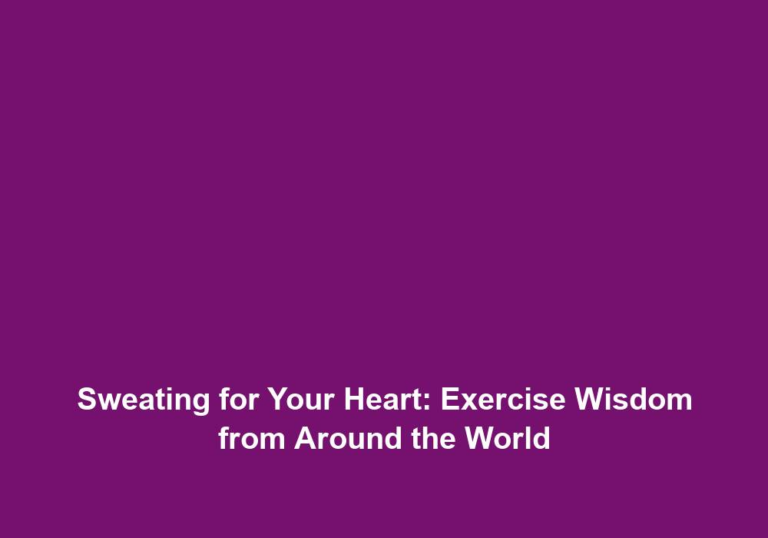Tai Chi’s Gift of Well-Being: Elderly Beginners’ Guide
Tai Chi is a traditional Chinese martial art that has gained immense popularity worldwide. Renowned for its graceful and flowing movements, Tai Chi is often referred to as a moving meditation. It provides numerous physical, mental, and emotional health benefits, particularly for the elderly population. In this article, we will explore the gift of well-being that Tai Chi offers, focusing on the essential aspects that make it an excellent choice for elderly beginners.
The Importance of Well-Being for Elderly Individuals
As individuals age, maintaining their overall well-being becomes increasingly important. Physical and mental health play a significant role in ensuring a high quality of life during the golden years. Engaging in regular exercise can help combat various age-related issues, such as reduced mobility, balance problems, joint stiffness, and cognitive decline. Tai Chi emerges as a gentle yet effective exercise option that addresses these concerns while promoting holistic well-being.
Physical Benefits of Tai Chi for Elderly Beginners
1. Improved Balance and Stability
One of the primary concerns for elderly individuals is maintaining balance and preventing falls. Tai Chi’s deliberate weight shifting and postural alignment exercises enhance stability and strengthen the core muscles responsible for balance. Regular practice significantly reduces the risk of falls, thereby promoting independence and confidence in daily activities.
2. Increased Flexibility and Joint Health
As we age, joint stiffness and reduced flexibility become common. Tai Chi’s gentle, flowing movements promote joint mobility, keeping the body agile and flexible. By focusing on weight transference and proper body alignment, Tai Chi enhances the range of motion and lubrication of joints, thereby alleviating discomfort and stiffness.
3. Enhanced Cardiovascular Health
Tai Chi may appear slow and tranquil, but it offers notable cardiovascular benefits. The gentle aerobic activity involved in Tai Chi practice helps improve heart health, blood circulation, and lung capacity. Engaging in regular Tai Chi sessions can reduce the risk of cardiovascular diseases and maintain overall cardiovascular fitness.
4. Muscle Strength and Endurance
Maintaining muscle strength and endurance is crucial, especially for elderly individuals. Tai Chi’s slow and controlled movements engage various muscle groups, promoting overall strength and flexibility. Regular practice helps to counteract muscle loss associated with aging and supports daily activities, such as carrying groceries or climbing stairs.
Mental and Emotional Well-Being Through Tai Chi
Tai Chi not only benefits physical health but also contributes significantly to mental and emotional well-being. The meditative aspect of Tai Chi practice offers a unique set of advantages, particularly for elderly beginners.
1. Stress Reduction and Relaxation
The slow, rhythmic movements, combined with focused breathing, create a calm and tranquil environment. Tai Chi serves as a moving meditation, promoting relaxation and reducing stress. Regular practice can help alleviate symptoms of anxiety and depression, allowing individuals to experience a greater sense of peace and serenity.
2. Improved Cognitive Function
Numerous studies have highlighted the positive impact of Tai Chi on cognitive function. The mind-body connection established during Tai Chi practice enhances concentration, mental clarity, and memory. Elderly individuals can benefit from improved cognitive abilities, which are essential for maintaining independence and overall well-being.
3. Social Engagement and Community Connection
Joining a Tai Chi class provides an excellent opportunity for elderly beginners to engage with like-minded individuals and foster a sense of community. The social aspect of Tai Chi can combat feelings of isolation and loneliness, promoting overall mental health and well-being. It allows individuals to connect, share experiences, and build meaningful relationships.
Getting Started with Tai Chi as an Elderly Beginner
If you are an elderly individual interested in trying Tai Chi, here are a few essential tips to get you started:
-
Consult with your healthcare provider: Before beginning any exercise program, it is crucial to consult your healthcare provider, particularly if you have any underlying health conditions or concerns. They can provide guidance on any modifications or precautions specific to your needs.
-
Find a qualified instructor: Look for a Tai Chi instructor who specializes in teaching elderly beginners. They can guide you through the proper techniques, ensure your safety, and tailor the practice to your individual needs. An experienced instructor can also provide modifications for any physical limitations you may have.
-
Start with gentle warm-up exercises: Begin each session with a series of gentle warm-up exercises to prepare your body for the Tai Chi movements. This helps prevent injury and promotes flexibility. Warm-up exercises may include gentle stretches, joint rotations, and deep breathing exercises.
-
Progress at your own pace: Tai Chi is not a competitive sport, and it is essential to listen to your body. Start with basic movements and gradually progress as you become more comfortable and confident. It’s better to practice with proper form and technique than to rush through advanced movements.
-
Practice regularly: Consistency is key when it comes to reaping the benefits of Tai Chi. Aim for regular practice sessions, even if they are short. Over time, you will experience the positive impact on your physical, mental, and emotional well-being. Consider setting a realistic schedule that works for you, whether it’s practicing a few times a week or every day.
In conclusion, Tai Chi offers a priceless gift of well-being for elderly beginners. Its gentle and flowing movements benefit physical health by enhancing balance, flexibility, cardiovascular fitness, and muscle strength. Simultaneously, the meditative aspects of Tai Chi promote stress reduction, improved cognitive function, and social engagement. So, if you are an elderly individual seeking a holistic exercise option that nurtures both body and mind, Tai Chi is an excellent choice to embark on your journey towards enhanced well-being.







